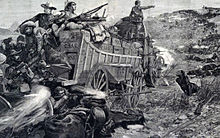Oh ! THE GLORY OF THE BRITISH EMPIRE -
SOAKED IN BLOOD
Ndebele Kingdom[
In the late 1830s, some 20,000 Ndebele, descendants of the Zulus in South Africa and led by Mzilikazi Khumalo, invaded the Kalanga Rozwi Empire. Many of the Kalanga people were incorporated and the rest were made satellite territories who paid tribute to the Ndebele Kingdom. He called his new nation Mthwakazi, a Zulu word which means something which became big at conception, in Zulu "into ethe ithwasa yabankulu" but the territory was called Matabeleland by Europeans. Mzilikazi organised this ethnically diverse nation into a militaristic system of regimental towns and established his capital at Bulawayo ("the place of killing"). Mzilikazi was a statesman of considerable stature, able to weld the many conquered tribes into a strong, centralised kingdom. In 1852, the Boer government in Transvaal made a treaty with Mzilikazi. However, gold was discovered in the neighbouring area known as Mashonaland, the home of the Ma-Shona, in 1867 and the European powers became increasingly interested in the region. Mzilikazi died on 9 September 1868, near Bulawayo. His son, Lobengula, succeeded him as king. In exchange for wealth and arms, Lobengula granted several concessions to the British, the most prominent of which is the 1888 Rudd concession giving Cecil Rhodes exclusive mineral rights in much of the lands east of his main territory. Gold was already known to exist, so with the Rudd concession, Rhodes was able to obtain a royal charter to form the British South Africa Company in 1889.
British South Africa Company
In 1890, Rhodes sent a group of settlers, known as the Pioneer Column, into Mashonaland where they founded Fort Salisbury (now Harare). In 1891 an Order-in-Council declared Matabeleland and Mashonaland British protectorates. Rhodes had a vested interest in the continued expansion of white settlements in the region, so now with the cover of a legal mandate, he used a brutal attack by Ndebele against the Shona near Fort Victoria (now Masvingo) in 1893 as a pretext for attacking the kingdom of Lobengula. Also in 1893, a concession awarded to Sir John Swinburne was detached from Matabeleland to be administered by the British Resident Commissioner of the Bechuanaland Protectorate, to which the territory was formally annexed in 1911 and it remains part of modern Botswana, known as the Tati Concessions Land.
First Matabele War

The first decisive battle was fought on 1 November 1893, when a laager was attacked on open ground near the Bembesi River by Imbizo and Ingubo regiments. The laager consisted of 670 British soldiers, 400 of whom were mounted along with a small force of native allies, and fought off the Imbizo and Ingubo forces, which were considered by Sir John Willoughby to number 1,700 warriors in all. The laager had with it small artillery: 5 Maxim guns, 2 seven-pounders, 1 Gardner gun, and 1 Hotchkiss gun. The Maxim machine guns took center stage and decimated the native force.
Although Lobengula's forces totaled 80,000 spearmen and 20,000 riflemen, versus fewer than 700 soldiers of the British South Africa Police, the Ndebele warriors were not equipped to match the British machine guns. Leander Starr Jameson sent his troops to Bulawayo to try to capture Lobengula, but the king escaped and left Bulawayo in ruins behind him.
An attempt to bring the king and his forces to submit led to the disaster of the Shangani Patrol when a Ndebele Impi defeated a British South Africa Company patrol led by Major Allan Wilson at the Shangani river in December 1893. Except for Frederick Russell Burnham and two other scouts sent for reinforcements, the detachment was surrounded and wiped out. This incident had a lasting influence on Matabeleland and the colonists who died in this battle are buried at Matobo Hills along with Jameson and Cecil Rhodes. In white Rhodesian history, Wilson's battle takes on the status of General Custer's stand at Little Big Horn in the USA. The Matabele fighters honoured the dead men with a salute to their bravery in battle and reportedly told the king, "They were men of men and their fathers were men before them."
Lobengula died in January 1894, under mysterious circumstances; within a few short months the British South Africa Company controlled Matabeleland, and white settlers continued to arrive.

No comments:
Post a Comment